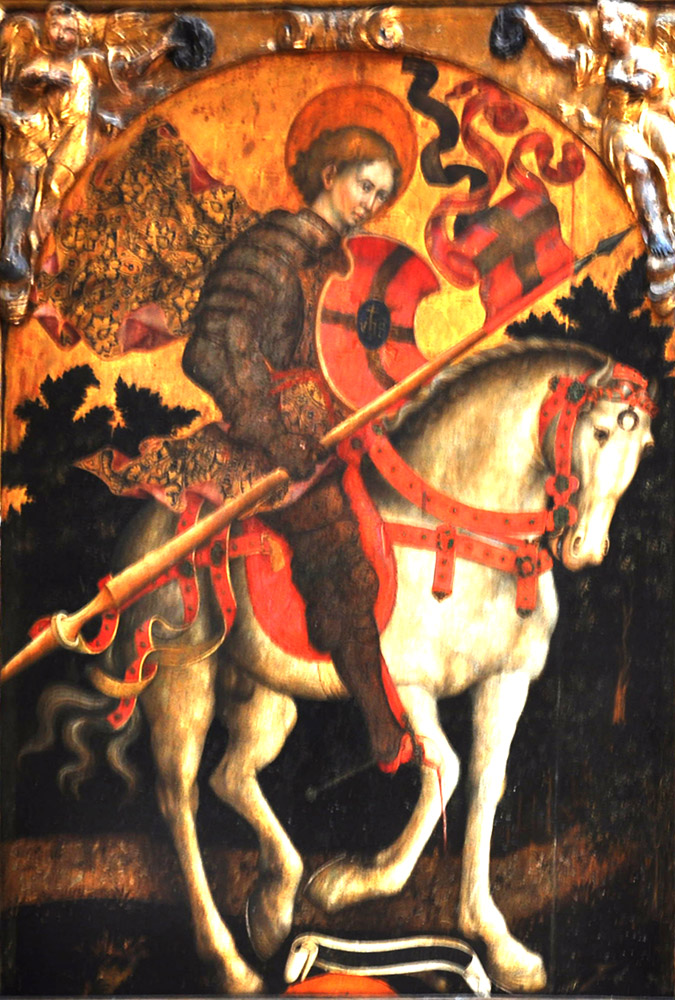To the holy confessor of Christ, Grysogone: I, Anastasia have taken the yoke of a wicked husband; by the mercy of God I have eschewed avoided his bed by feigned and dissembled infirmity, and have night and day embraced the steps of our Lord Jesu Christ. And my husband hath taken away my patrimony, of which he is ennobled, and setteth it on foul idols, and hath put me in prison as a cursed enchantress for to make me to lose my life temporal. So there bleveth remains no more, but I that am servant to the spirit, may lie down and die. In which death I glorify myself, but I am greatly troubled in my mind, that my riches which I had ordained consecrated, dedicated to God be wasted and spent in foul things. Farewell, servant of God, and remember me.To whom S. Grysogone answered again by writing:
See that thou be not angered ne nor troubled for any thing that is done to thee feloniously wrongfully in thy life, though it be contrary unto thee; thou mayst not be deceived if thou be proved. tested A time peaceable shall come to thee anon, soon for after this darkness thou shalt see anon the flourished light of God, and after this cold time of frost and ice there shall come to thee soft and sweet time. Farewell, be with God and pray for me.And as this blessed Anastasia was thus constrained in such wise that unnethe hardly any bread was given to her in four days, and that she supposed she should have died, she wrote an epistle to him in this wise:
To the confessor of Christ, Grysogone, Anastasia. The end of my time is come, remember me so that when the soul shall depart from me, that he receive it for whose love I suffer these things, which thou shalt hear by the mouth of this old woman.To whom he wrote again:
It appertaineth is natural, is appropriate always that darkness go tofore the light. In like wise after sickness and infirmity health shall return, and life is promised after death. All adversities and prosperities of this world be enclosed by one end; because desperation should have no dominion on the sorrowful, ne neither elation ne nor pride should not dominate on them that be glad and joyful. There is but one sea in which the ship of our Lady saileth, and our souls use the office of mariners under the governance of the body, and the ships which be fastened and bounden with strong chains pass well without any breaking through the strong waves of the sea. And some ships there be that have brittle and feeble jointures of trees, joints connecting the planks and fall oft in peril to be drowned, but thou handmaid of Jesu Christ, have in thy mind the victory of the cross, and make thee ready to the work of God.And then Diocletian, which was in the parts area of Aquila, Aquileia (in Friuli, Italy) and slew other Christian men, commanded that Grysogone should be brought tofore him; to whom he said: Take the power of the provost, and the consulate of thy lineage, and do sacrifice to the gods.
And he answered: I adore and worship one only God of heaven, and I despise thy dignities as filth or mire.
And then sentence was given upon him, and he was brought into a place where he was beheaded, about the year of our Lord two hundred and eighty-seven, whose body S. Zelus the priest buried, and the head also.
Golden Legend Table of Contents
Christian Iconography Home Page

Chrysogonus's attributes are a shield and banner, each bearing a cross. (See the description page for this image and the page explaining the iconography of images of this saint.)
VORAGINE'S ETYMOLOGY FOR THE NAME CHRYSOGONUS
Grysogone may be said of gonos in Greek, which is as much to say as angel, for he was without angel of worldly malice. Or he is said of gonos, which is as much to say as a leader, for he led much people to the way of truth by his ensample.
This text was taken from the Internet Medieval Source Book. E-text © by Paul Halsall. Annotations, formatting, and added rubrics by Richard Stracke. Permission is granted for electronic copying, distribution in print form for educational purposes and personal use. If you do reduplicate the document, indicate the sources. No permission is granted for commercial use.